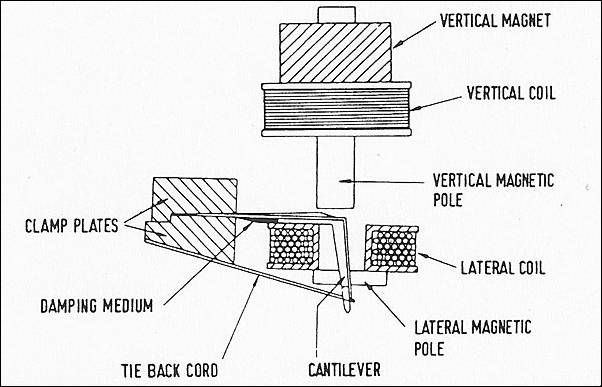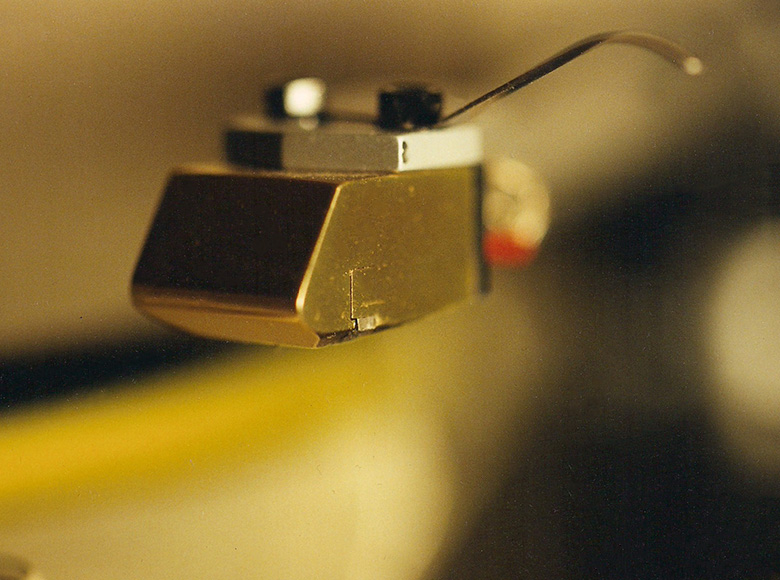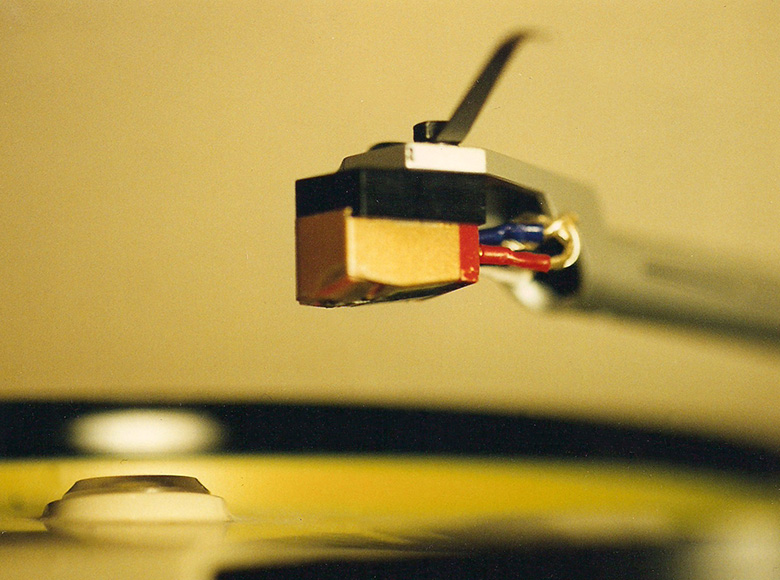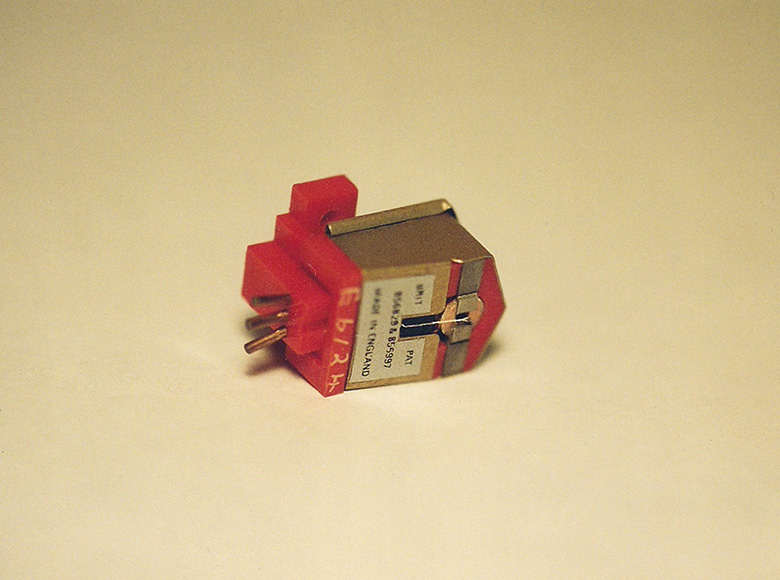LONDON (DECCA) ARE THESE THE WORLD'S BEST PHONO CARTRIDGES?
Experienced reviewers have stated unequivocally that no other cartridge in the world can match the London (Decca)'s head-spinning musical realism. Another claims it sets an example for all other cartridges (presumably, including more costly ones), in the area of dynamics, rhythm, pacing and timing.
How and why is this cartridge different from, and possibly superior to all the others?
Is it a "moving coil" or a "moving magnet" design? Neither! Only a lighter, thinner shorter, magnetically active metal foil, bearing the stylus, comprises the entire moving system. This results in lower moving mass than either moving coil or moving magnet models.
The London (Decca) cartridges may be the only ones that have no cantilever, in the conventional sense. This appears to be the underpinning of their stunning success- it has been said that the London Deccas "reek of musicality."
Other cartridges (both moving coil and moving magnet) mount their styli on the long end of a thin tube (cantilever) which works like a lopsided "see-saw." The short end of the cantilever attaches to either a coil of wire or a magnet. At the fulcrum point, a flexible "rubbery" sleeve functions as a pivot, allowing the stylus/cantilever assembly to respond to the "wiggles" in the LP groove. Because the front section of the cantilever, which holds the stylus, is much longer than the rear section which is attached to the coil or magnet, a large movement of the stylus is transformed to a smaller movement at the coil or magnet, possibly causing cantilever-design cartridges to sound dynamically compressed and lacking in transient attack. London (Decca)'s engineers advise that this problem with dynamics and transients is compounded by the cantilever's "rubbery" fulcrum point which tends to absorb a significant amount of the stylus-generated motion, before it can reach the coil/magnet electrical generator assembly. Also, a smearing of the sound is said to occur, which they refer to as "cantilever haze."

But in the London Decca, there is no long cantilever and no "rubbery" fulcrum point to absorb, dissipate and smear the vital musical energy. Instead, the stylus is attached directly to a magnetically active, metal support just a few microns thick (armature) that passes through the center of the main generating coil- positioned only about 1 millimeter above the stylus! The stylus motion is not inverted or "transformed" to a smaller value, as in long cantilever designs. Flowing from this immediate- positive-direct scanning of the groove is a breathtaking "alive" quality. The listener tends to feel that the performing artists are actually in the same room, with a startling, palpable presence.
From the beginning, music lovers have lauded the unparalleled vividness of the Deccas which were first introduced over 50 years ago. However, earlier models were criticized, at times, for such reasons as their unusually high vertical tracking force, a tendency to mistrack, and the need for special (damped) tone arms. But the current cartridges track securely at only 1 – 2 grams, and damped tonearms are not required (or even desirable).
So, what does it sound like? Warren Gregoire attempts to answer this question:
"Like no other Decca or London (Decca) cartridge previously produced."
Warren continues: "I have been a big fan of the Decca cartridge since I heard music through one for the first time, in 1970. But like many other music reproduction enthusiasts, my liking was tempered by the sometimes harsh, aggressive quality of the early cartridges. Subsequently, the new Super Gold and Jubilee moderated these traits to the point where I preferred them even over some considerably more costly moving coil cartridges."
But the London (Decca) Reference is not another incremental improvement, further moderating the less desirable traits of previous Deccas and Londons. Instead, it is a quantum leap into a new world of LP reproduction, never before available, at any price. The Reference has all the good qualities of the most costly moving coil designs, and more... so much more. The dynamic impact of Decca cartridges has always been their hallmark. But now the Reference delivers accurate dynamic tracking like no cartridge has ever done before. Not only is it exciting and dynamic sounding, but the dynamics truly follow exactly what's there on the LP.
Percussive effects of any kind and plucking and strumming are simply breath taking in their realism.
"Then there are the voices. I never imagined I would hear human voices reproduced with the completely convincing quality the Reference routinely musters. This 'super-realism' quality is apparent even on 50-year old mono LP's."
If you must hear ALL of the music on your LP's, in the most enjoyable manner possible, you must procure a London (decca) Reference cartridge. It is really the ONLY way I am aware of. My apologies to the $7500 moving coil guys and all the rest. But after careful evaluation, this is my true opinion. And I will no longer be satisfied listening through some pricey MC's that have been my previous favorites.
The London company seems to be having a difficult time keeping up with the worldwide demand for this hand crafted wonder. But it is our policy to attempt to have them in stock at all times. Basically, our firm always has the Reference and other top London (Decca) models in stock, or has them on order.

The London (Decca) Reference cartridge $5000*
The London (Decca) Jubilee cartridge sounds exactly like the Reference (Almost!) The basic sound quality is the same, but fine detail and musical nuance is not quite as good. That being said, one could likely not hear much difference in these two models unless they are paired with excellent, probably very expensive arms and turntables. (If you have a great quality budget setup, the Jubilee might sound as good or better than the Reference.)

The London (Decca) Jubilee Cartridge $3000*
The London (Decca) Supergold Cartridge uses the same positive scanning technology as the Reference and Jubilee, but more modestly implemented. Although they are excitingly dynamic and provide startling realism, resonances in the less costly housing can sometimes result in a tendency toward “extra brightness.” But this could be just the thing to perk up a good budget system that suffers from a somewhat dark and / or “lifeless” quality. A London (Decca) Super Gold may be the most cost effective upgrade for such a system

The London (Decca) Super Gold Cartridge $1600*
The London (Decca) Gold cartridge is the same as the Super Gold, but instead of the more costly line contact stylus, it uses an elliptical stylus. The most notable difference from the Super Gold is that frequency response that rolls off above 20kHz (instead of continuing to nearly 50kHz.) Although humans cannot hear above 20kHZ, Tests have shown that the absence of ultrasonic frequencies can be heard as “a less open, less airy sound.” But if the other components of a good budget system do not reach into the ultrasonic region, the London (Decca) Gold could be the correct choice.

The London (Decca) Gold Cartridge $1200*
The London (Decca) Gold cartridge is the same as the Super Gold, but with less costly elliptical stylus.
The London (Decca) Maroon Cartridge $950*
The London (Decca) Maroon cartridge is the same as the Super Gold, and the Gold, except for its SHPERICAL stylus tip. This results in playback that is slightly less detailed than the more costly London (Decca)s. But this cartridge is a favorite of collectors of costly LPs because the spherical stylus profile is the safest possible configuration that has the least potential to damage the grooves, in case of improper setup, or accidental maladjustment. The more modest price can allow it to fit logically into many budget systems.
*if the buyer is capable of doing the installation and setup, an attractive cash allowance / credit may be available. Please phone 510-282-9300 or 800-634-0094 for details.
QUESTIONS & ANSWERS
(Things you may have wondered about Decca cartridges but never got around to asking us)
Q: Are today’s London (Decca) cartridges made by the same organization as “the Deccas of old?” And why is the Decca name shown in parenthesis? A: Yes! The same personnel who designed and manufactured the original Deccas that were made starting in the 1960’s also design and make the current products. However, around 1980, These (former) Decca employees purchased the rights and tooling for the phono cartridges and related products from Decca Gramophone Corporation, and formed today’s London Company. Even though London is no longer affiliated with Decca, they are legally allowed to use the name parenthetically, to let people know that this is the same technology formerly developed and marketed by Decca Gramophone.
Q: Does the sound of Decca cartridges degrade or change fairly radically, over time? A: Prior to the 1990’s the material used for the tieback cable was organic, and in some but not all cases, stretching could occur, causing the armature to be repositioned off center in the forward direction. During the early 1990’s the London company switched to a synthetic material that is not subject to stretching. Older cartridges are routinely upgraded to the new tieback material during stylus replacement.
Q: I have gathered the impression that Decca cartridges are unusually difficult to install and set up. Is this true? A: No! The ease of installation is comparable to most other cartridges. Earlier Deccas had only three output terminals, but all of today’s London (Decca)s have four terminals just like other cartridges.
Q: Do Decca cartridges require higher vertical tracking force than other cartridges. A: No, the current London (Decca)s have a VTF range of 1 to 2 grams. Some Legacy models from the early years required slightly higher tracking forces.
Q: (Tone Arm Damping) Do I need a “damped” tonearm to use a Decca in my system? A: We prefer not to use damping with any of our Decca installations, but some people like it. Generally speaking, any arm (with damping or not) that works well with today’s moving coil cartridges should work fine with any of the Deccas. The quality (and likely the cost) of the tone arm should be matched to the cartridge. If you want the most bang for your buck using a cool old SME 3009 or similar, the best Decca you should logically choose may be the Jubilee. Arms like this likely won’t reveal the extra goodness of the London (Decca) Reference. For that you would need SME V series, a much more costly and capable arm, or other top quality arms.
Q: (Turntable Compatibility) Can I use a London (Decca) Jubilee in my Linn LP12 with Itok tonearm? A; Not recommended, because the LP12 suspension resonance coincides too closely with the cartridge/arm/turntable low frequency resonance, and severe misstracking can occur. Although it may be possible to find an arm and a particular Decca cartridge that would work with the LP12, things might not work out well on the first try. Other floppy suspension turntables may or may not work well. Massive solid rigid platform turntables without any sprung suspension are recommended. We particularly like idler rim drive tables like Garrard 301, 401, Thorens TD124 with custom marble plinth. We are available on the phone to discuss your particular situation. 510-282-9300 or 800-634-0094
Q: I understand that there have been many unfavorable reviews of Decca cartridges. Why is this the case, if the Decca cartridges are so great? A: There have been numerous rave reviews, mediocre reviews and negative reviews over the years. We believe the first negative ones in the early 1970’s resulted from pairing the Decca with low mass tonearms that were popular at the time (i.e. Infinity Black Widow). That resulted in a low frequency resonance above 20Hz, causing severe misstracking. The Deccas must use medium to High mass arms (fortunately most of today’s arms are exactly that.). Then starting around the late 70’s the Linn LP12 became overwhelmingly the most popular turntable. So reviewers bolted Deccas into LP12’s and had bad experiences due to the bass resonance frequency of the Linn’s floppy suspension being too close to the cartridge/arm/turntable resonance frequency. It may be fair to say the unfavorable reviews mostly have resulted from improper pairing with turntables and tonearms.
Q; What phono preamps are appropriate for use with Deccas? A: Nearly any tube phono stage, or modern high quality solid state units should work well. No pre-preamp or stepup transformer is needed, nor can it be used with a Decca. The input referred to as MAGNETIC PHONO must be used. A MOVING COIL input cannot be used because the gain is too high and severe overload distortion would occur. It is very desirable for the preamp to have a wide overload margin, to accommodate the high instantaneous peaks produced by the Deccas. This probably rules out “vintage” solid state preamps that might overload too easily.
Q: If my Decca stylus should wear out, or be broken, can this be fixed? A; Like virtually all premium quality cartridges, stylus replacement must be done at the London factory. Almost any Decca of any age can be overhauled by the London Company. Call us for details at 510-282-9300 or 800-634-0094.
Q: (Any other Decca question you have in mind) A: (Phone us at 510-282-9300 or 800-634-0094 and we shall try to provide an answer.)